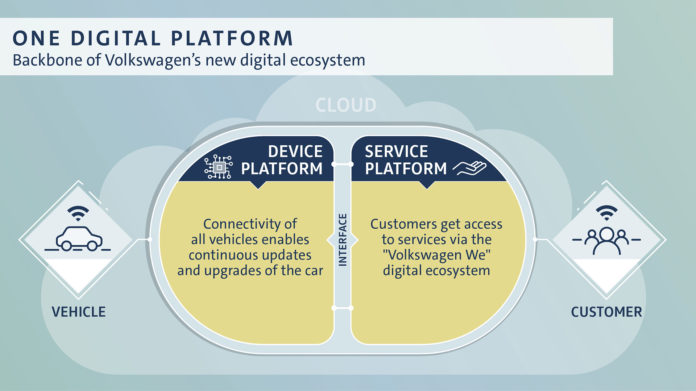
Volkswagen in transition: the company is speeding up the development of its ecosystem with its own software know-how and the strength of external partners. The automobile will evolve into a central hub in the Internet of Things.
“We have a clear vision: we will continue to build vastly superior vehicles. But going forward, our Volkswagens will increasingly become digital devices on wheels”, Jürgen Stackmann, Volkswagen Brand Board Member for Sales, said today at a press conference in the Group Representative Office in Berlin.
“Our customers will become part of an ecosystem that we have named ‘We’. This system complements the Volkswagen experience on wheels and enables customer to take their world into their vehicle”, Stackmann commented, adding that the brand hoped open interfaces would also encourage third parties to participate in creating a strong community by contributing their own software.
Ever more important role of software in cars
Michael Jost, Chief Strategy Officer of the Volkswagen Brand and Head of Group Strategy Product, emphasized that software and the associated services would make a significant contribution to differentiation in the automobile industry in future. According to Jost, “to deal with this development, we need to reinvent the automobile in some ways.”
That includes a redesigned, much simpler vehicle IT architecture, which will celebrate its premiere in the I.D. family of electric models from 2020. This IT architecture dispenses with a large number of separate control units that run on manufacturer-specific software – today, there are as many as 70 such units in a vehicle.
Instead, vehicle intelligence will be concentrated in just a few computers with a unified programming language. In future the software will come from one source – the customer will experience services based on the “vw.OS” automotive operating system.
As Jost explained, “separating the hardware from the software lays the groundwork for continuous updates and upgrades.” Furthermore, this means climbing to the next level on the road to autonomous driving.
2020 will be a turning point for the Volkswagen brand
2020 will therefore be a turning point for the Volkswagen brand. While today, some 1.5 million vehicles with no online access can already connect with the Internet thanks to the “Volkswagen Connect” retrofit solution, 2020 is the year when Volkswagen begins connecting its entire fleet. Each year, over five million new vehicles will then become part of the Internet of Things.
Volkswagen has also realigned its sales model to keep the ecosystem as open and accessible as possible. For the first time, the new dealer contracts allow Volkswagen to engage direct with customers over the vehicle’s entire life cycle. Customers can thus receive tailor-made offers without having to make an appointment with a workshop.
Creation of a Group-wide platform
The backbone of the ecosystem will be a Group-wide, primarily cloudbased platform, the “One Digital Platform” (ODP). This platform is mainly based on cloud-technology and connects the car, the customer and the services.
The ODP ensures the connection with our IT architecture comprising Volkswagen services or such of external partners which are
integrated in the Volkswagen ecosystem.
“Volkswagen is spearheading the development of the OPD in collaboration with the Group brands. And we are seeking additional external support. We will soon be announcing cooperation projects and partnerships”, Christoph Hartung, Head of Digital & New Business / Mobility Services at the Volkswagen brand, said.
Over €3.5 billion for the digitalization initiative through 2025
With its “Transform 2025+” strategy, the brand launched the biggest change process in its history. By 2025, Volkswagen intends to play a leading role in the new automobile industry, set up innovative mobility solutions and become the world market leader in e-mobility. The focus is on the evolution from an automaker to a mobility service provider with a connected fleet.
The Volkswagen brand is planning to spend some €3.5 billion on its digitalization offensive during this period and intends to generate sales revenue running into billions from digital offerings and services.
About the Volkswagen brand: “We make the future real”
The Volkswagen Passenger Cars brand is present in more than 150 markets throughout the world and produces vehicles at over 50 locations in 14 countries.
In 2017, Volkswagen delivered 6.23 million vehicles, including bestselling models such as the Golf, Tiguan, Jetta or Passat. Currently, 198,000 people work for Volkswagen across the globe.
The brand also has over 7,700 dealerships with 74,000 employees. Volkswagen is forging ahead consistently with the further development of automobile production.E-mobility, smart mobility and the digital transformation of the brand are the key strategic topics for the future.








